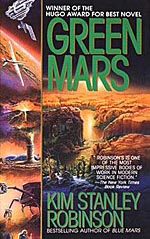
![]() jfrantz
jfrantz
12/5/2012
![]()
The second installation of the Mars Trilogy, Kim Stanley Robinson's magnum opus. If you don't know it, you should. Many years have passed since the revolution of '61, yet very little has changed.
Hard Science
I don't think it is possible to read anything on the interwebs about the Mars Trilogy without hearing about how Robinson sets the standard for Hard-SF and for exploring the real science required by Mars colonization. Chances are, if you're reading this, and I know you are, you have probably already read somewhere else, everything I could possible say about how comprehensively Robinson tackles the possibility of human occupation of the 4th planet. I agree with the sentiment completely and I consider myself part of the mountain of readers/reviewers/bloggers lying prostrate before the holy relic of Hard-SF that is the Mars Trilogy. I'm not lying about this. I sleep with copy of Red Mars under my pillow.
The only two things I might add, and I'm sure I'm probably repeating someone out there, is to mention how beautiful that science is and what it means when people say that.
Yes, as you've heard, Robinson redraws the map from which an author can tackle the science of colonization. What I don't hear mentioned as often is how lovingly he portrays science. Robinson gives so much ridiculous detail. How often do you expect to hear the scientific name of a plant in a novel, or a run-down of the billions of years of geological processes that created the land a character visits, or the atmospheric pressure? Not often is the answer. I imagine some people have a hard time with this, but for me it struck me as something of a new standard. How can I talk about an author's worldbuilding if they don't mention these things now?!
And I touched on my second point there. Reading Green Mars, means getting familiar with with phrases like long run-outs, katabatic winds, non-shivering thermogenesis, with references to Bookchin, Kuhn, Nietzsche, Bakunin. Reviews always mention that Robinson's is the first and most comprehensive attempt at imagining a colonized Mars and the science it would take to achieve such a feat. They don't always clarify that his imagining is not just conceptual or vague in any way at all. If you decide to begin the Mars Trilogy, you will probably encounter quite a lot that you are not familiar with and you will read about some very specific and detailed scientific concepts related to colonizing Mars. I don't bring this up to scare anyone away. I bring this up because it is so surprisingly satisfying and enriching.
A transformational novel
With a cast like the First Hundred, I'm sure there is no end to the favorite character combinations that could exist out there. In Red Mars, mine were John Boone and Nadia "of the nine fingers" Cherneshevsky. In Green Mars it was unquestionably Sax Russell but also the mythical Desmond "The Coyote" Hawkins.
It was so much fun to watch the First Hundred go from excited and nervous scientists to deadly and transformational leaders of the strangest colony. It is truly hard to get better than that transformation. Green Mars does an amazing job of making that a trend.
I thought Part 4, "The Scientist as Hero", might have been one of the best chapters of a book ever. It picks up Sax's story pretty much where he left off in Red Mars and begins by humanizing him first. Tired of living in hiding and feeling like he wasn't doing any real work, he finds a way back to the Martian surface and we get a close-up view of the inner workings of his mind though his attempt to look at Mars from a newcomer's eyes and his torrid affair with Phyllis. Awful Phyllis.
Part 5, "Homeless", then breaks Sax down completely. Not only was this heart wrenching but so poignant in the way he needed to be completely debilitated before going through his metamorphosis. His struggle to regain his faculties is, touching, but also a demonstration that Robinson can go so much deeper than scientific names and the excitement of guerilla warfare. Watching Sax grow from a slavish dependent of the scientific method and the doing of science to "General Sax" was profound and was the epitome of the other kind of realism, I'll call it emotional realism, that Robinson can perform so damn well.
And Robinson carried this theme of transformation throughout the entire story, most importantly to the population of Mars in general. Mars has gone from a poisonous world to a place where people are born.
The audiobook
Listen to Richard Ferrone. Do it. I had to finish by reading the actual print copy because of some technical difficulties and I was reading to myself in his voice. His voice is a little rough at first, but his reading came to embody the entire series for me.
Recommendation
If you've only read Red Mars, or if you haven't started the series yet and you're wondering if you should continue with the whole series, know that Green Mars will change you in the same ways that Red Mars did. I loved Red Mars so much and Robinson covered so much ground that I was both nervous and skeptical that I could possibly enjoy the sequel at all. In fact, it was so good that I have a hard time not thinking of them as just one book. For the last few months, I've been telling people that Red Mars might be my favorite book EVER. Any reader knows that is a serious statement to make. After Green Mars, and while I haven't yet finished Blue Mars, I've already started saying that the Mars Trilogy are my favorite books EVER.
http://hugoenduranceproject.blogspot.com/2012/12/green-mars.html